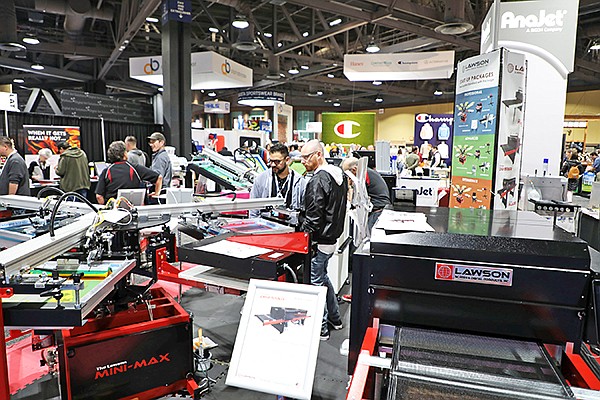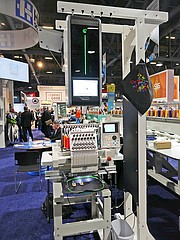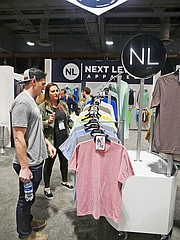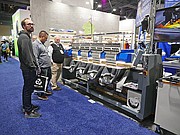FIRST IMPRESSIONS
Impressions Expo Rebrands the Basics-and-Tech Trade Show
Hundreds of companies travel to Long Beach, Calif., every January to exhibit their new approaches to the production of T-shirts and other basics at the newly renamed Impressions Expo, which ran Jan. 17–19 at the Long Beach Convention Center in Long Beach, Calif.
For its 42nd anniversary, Impressions unveiled a rebranding effort at the show, which until last year was called the Imprinted Sportswear Show, or ISS, said Josh Carruth, Impressions’ show director. The new name comes from the trade show’s magazine, which is also called Impressions.
“We’ve aligned with our publication to create a single platform to serve our communities as opposed to presenting an array of individual shows, magazines and digital offerings,” Carruth said of the rebrand.
The show is owned and produced by Emerald Expositions, the company that also produces the trade shows Surf Expo,Active Collective and Swim Collective. Other Impressions Expo shows are produced in Atlantic City, N.J.; Ft. Worth, Texas; Baton Rouge, La.; and Orlando, Fla.
Carruth said that the show’s booth space was almost sold out at the Long Beach show, where 300 companies exhibited everything from blank apparel and textiles to digital printers, embroidery machines, screen-printers and screen-printing supplies.
About 15,000 people attended the show, which included 11,000 qualified buyers who were confirmed as representing companies with proven track records in producing and distributing T-shirts.
For the first time in its history, the trade show also produced a giant party. On Jan. 22, approximately 2,500 people attended the party, called Ruckus, located in a plaza in front of the Terrace Theater, adjacent to the convention center. The party offered a beer garden serving free drinks, food trucks, as well as a performance from Long Beach band Galo and 1990s hitmaker Mark McGrath of the band Sugar Ray, Carruth said.
“It was all about celebrating the industry and the impact these businesses have on millions of people’s lives every day,” he said. “It doesn’t happen enough.”
Impressions holds a unique place on the fashion-trade-show calendar. It’s where representatives of brands and apparel companies go to see what is new in the basics market and check out the latest in machines that print graphic images on tees, said Ken White, vice president of sales at Cotton Heritage, based in Commerce, Calif.
“The stars of the show are brands and the printers that come to the show,” White said. A significant part of the event’s business was devoted to holding meetings with brands looking to make private-label clothing, he said. About 25 percent of Cotton Heritage’s business focuses on developing styles for private-label customers.
Impressions also serves as a first look at what T-shirts will be on the market in the upcoming year. Established and emerging T-shirt brands exhibit in order to get on the radar of buyers, said Benjamin Greene of Prepared Blanks, which started business in 2019 in Alhambra, Calif.
“This is the Super Bowl for the industry,” he said. “We have to have a presence here.”
Many of the exhibitors showed T-shirts with the boxy silhouette that is currently in style, said Shawn Joseph of the Chino, Calif.–brand Quarterfinal. “The trend is boxier shirts made with thicker material that is still comfortable,” he said. Felix Iniquez of BullsEye Merchandising of Santa Fe Springs, Calif., said that bright colors have been popular, as have basics with a vintage look.
Bayside America introduced the Super Heavyweight street-style hoodie, which is a 17-ounce hoodie. Other basic garments introduced at the show were also thick and boxy, said Abdul Rashid, chief operating officer of Bayside.
“Millennials have a different style,” he explained. “They want a different look and a beefier feel.”
At the booth for Los Angeles Apparel, new styles on display included a garment-dyed, short-sleeved, crew-neck shirt and other basics such as a heavy-jersey garment-dyed gym short. Heavy, boxy T-shirt styles have been in vogue for a few seasons, but Los Angeles Apparel’s founder, Dov Charney, forecasted that it will change.
“It is harder to make big changes in the imprintable industry,” he said. “Eventually it has to happen because the ultimate consumer doesn’t want to have a giveaway T-shirt. They are looking for something that is perceived to have more quality.”
Technology was also a major focus at the Long Beach show. Carruth estimated that 60 percent of the show’s floor space was devoted to technology companies. They ranged from Ryonet + ROQ displaying screen-printing machines that were large enough to fill a room in the convention center to Coloreel, a Swedish company whose machine generates instant thread coloring during garment production. The machine was the first thread-coloring unit made to be used with industrial embroidering machines, according to a Coloreel statement.
Digital-printing company Kornit introduced the Kornit Volcan Plus. Kornit’s Ronen Samuel said that the Vulcan Plus was a reinvention of the company’s legacy Vulcan platform.
“It’s the fastest system going on the market,” Samuel guaranteed. “It can print 200 pieces in an hour.”
Epson America introduced the SureColor F3070 during the event. The technology company’s Tim Check said that the machine was made for efficiency and speed. “It prints a full-size shirt, from top to bottom, under a minute and for under a dollar,” he said.
Attendees shopping for digital printers said that the machines have been changing the industry.
Brian Rohr of Coast 2 Coast Tees, based in Manhattan Beach, Calif., said that digital machines have allowed more people to enter the industry.
“Instead of the guy with a factory and a full staff, you’re going to see someone working with just a cell phone and an Instagram profile,” Rohr said. “People are crowdfunding T-shirt lines. Barriers to entry in this market are a lot lower.”
Lee Stannard, production manager for WrestlingMart in Irvine, Calif., said that digital printing has allowed companies to do more testing of product.
“We can print shirts and get them up on the website,” he said. “If the T-shirt is really popular, we can send it out to the screen-printer.”
Photos by Mike Duncan

























